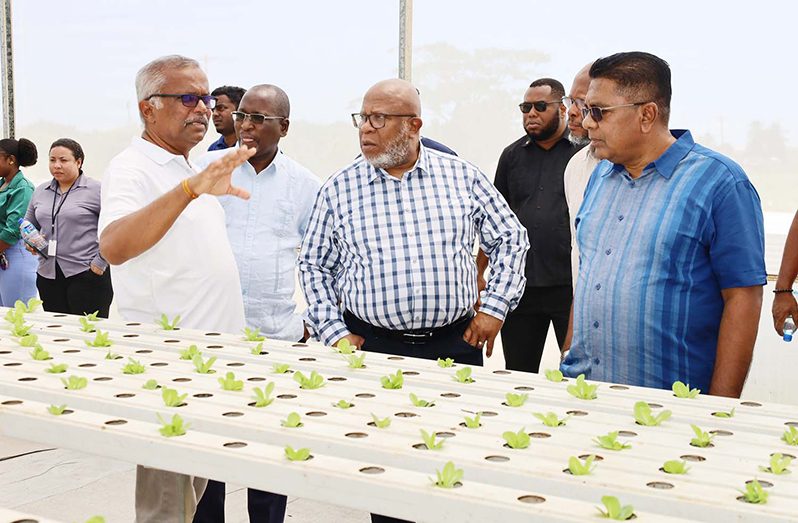–UN General Assembly President says; lauds Vision ‘25 by 2025’
ALTHOUGH the impact of Hurricane Beryl on the Caribbean’s agriculture sector has been devastating, the President of the United Nations (UN) General Assembly, Ambassador Dennis Francis has boldly stated that there will be no failure in the Region’s vision of reducing the food-import bill.
During a press conference on Saturday at the UN House, the Ambassador commended Guyana for its leading role in the sector, and said that he was impressed with the research and ongoing developments that he witnessed during his visit to National Agricultural Research and Extension Institute (NAREI).
Vision 25 by 25 was officially implemented in 2021, laying out the groundwork for a long-term social and economic partnership among member states, the regional private sector (CARICOM private sector organisation-CPSO), regional organisations, producer groups, development partners and civil society to collaborate and invest in initiatives to address the regions’ rising food-import bill and improve intra-regional trade.
The mere fact that the Region had set its eyes on achieving President Dr. Irfaan Ali’s brainchild, which is Vision ‘25 by 2025’, and even mobilised the resources and people to achieve it was labelled as “visionary leadership” by Francis.
He said: “I cannot sit here and tell you that we will achieve 25 by 25 perhaps we’ll achieve 23 by 25 [or] perhaps we’d achieve 30 by 25; 25 is just the target. We could surpass it, or we could fall short of it. However, even if we fall short of it, the result would have been a significant improvement and achievement over what exists now.”
Further, the UN General Assembly President went on to say that the limit is not 25 per cent, and one must not deem it a failure if this number is not met.
“There will be no failure, because what happens by 2025 whether we achieve that target or not, there is going to be a significant achievement in terms of the output and production of food in this region,” the Ambassador said.
He explained that this is all about expansion of food production and scaling it up, and doing it at a rate that would make a quantum difference in providing jobs, sustenance and reducing the amount of foreign exchange used to purchase food.
Notably, by the end of 2026, it is expected that the region will be fully-sufficient in its production of corn, soya bean, and black eye peas and red beans.
Also, Guyana has been steadily increasing its food production and expanding the cultivation of new crops such as corn, soybeans, and wheat to meet the demands of not only its domestic market, but also of the entire region.
RESILIENCE
Last month, the Regional Economic Agri-Insurance Programme (REAP) was launched.
Direct payouts for production expenses and business disruptions are provided by REAP’s insurance products.
The primary goals of the Caribbean Community’s Special Ministerial Task Force on Food Production and Food Security are similar to that of REAP’s mission, which is to encourage healthy eating habits, increase food security, and maintain financial resilience throughout the Region.
The programme’s innovators are nine Caribbean countries: Dominica, Guyana, Barbados, St. Lucia, St. Vincent and the Grenadines, Grenada, and St. Kitts and Nevis.
According to Guyana’s President and Lead Head of Government with responsibility for Agriculture and Food Security, Dr Ali, as the Region builds back what was lost owing to the natural disaster, the future must be crafted within this plan.
With that said, the President highlighted the importance of sustainability and resilience and how systems must be crafted to reflect this.
According to the Head of State, for too long, decisions have been made without data and research on matters such as soil type and the utilisation of land and water.
President Ali said: “If we can bank a business plan with good research and data, then we make it easier for the farmers to have access to the banking sector.”
Additionally, the President said that the integration of technology with livelihoods, and financial instruments are also essential.
Dr. Ali then said: “When we first started this journey, just finding an interesting insurance product was difficult…I would encourage you to formalise a product to now open the wings and to invite all the other brokers, all insurance companies…so that we cover the region.”
Managing Director, Lynch Caribbean Brokers, Damien Bowen, underscored that the mission of his organisation was to aid its Regional clients and protect them against challenges, in this case, climate threats.
The Caribbean insurance product for the agriculture sector was designed by Lynch Caribbean Brokers in collaboration with GuyCarpenter, Raincoat. The product will be driven by the private sector.
REAP, according to him, will also protect and propel vision ‘25 by 2025’ against climate change.



.jpg)








